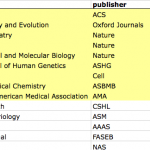PubMed
When finding a female scientists' data turns into an archeological treasure hunt.
A few months ago, I decided it would be interesting to celebrate various scientific contributions by making images of chemical / molecular structures in the Molecule World iPad app and posting them on Twitter (@MoleculeWorld). Whenever I can, I like to highlight scientific contributions from women on their birthdays. Tomorrow's post will feature Dr. Isabella Karle, an x-ray crystallographer who worked on the Manhattan project and solved structures of interesting molecules like…
Somebody please tell me why the national library of medicine gave up their pubmed.com and pubmed.org domains? It used to be you could just type "pubmed.org" and get pubmed. Now, some cyber squatter has put some worthless spam search on the site. Before I realized it wasn't a site redesign my search got me redirected to a celebrity gossip site, then experimenting with the same search I got a site selling anti-aging cream.
Really? How much does it cost to keep a domain a year? And for that matter, what cyber squatter thinks redirecting scientists at celebrity gossip sites is a great…
The Backstory: As it stands today,when one of the National Institutes of Health (NIH) provides the funding for a scientific research project, and those results are published, they must be made freely available to public, within a set period of time. The reasoning behind this requirement is that taxpayers funded everything about the research except for the final publication, and so they have already paid for access.
The Research Works Act (#RWA), HR 3699, is a bill in the House of Representatives that would roll back this requirement. If it passes, taxpayers will…
This morning, I learned that congress wants to reverse the advances made by NIH and go back to restricting access to scientific publications. Congresswoman Carolyn Maloney (New York) and Congressman Darrell Issa (California) are co-sponsoring a bill to restore the limits on public access to NIH-funded research.
I've written many times before (here, here, here, and here) about the challenges that community college faculty and students have in getting access to scientific papers.
In an era where the economic benefits of educating students in science are well-known (1), the idea of crippling…
Science is supposed to be a project centered on building a body of reliable knowledge about the universe and how various pieces of it work. This means that the researchers contributing to this body of knowledge -- for example, by submitting manuscripts to peer reviewed scientific journals -- are supposed to be honest and accurate in what they report. They are not supposed to make up their data, or adjust it to fit the conclusion they were hoping the data would support. Without this commitment, science turns into creative writing with more graphs and less character development.
Because the…
PubMed is an on-line database at the National Center for Biotechnology Information (NCBI) that contains information from scientific literature. Most of the information is related to medical research.
To search PubMed, you use a program called Entrez. You go to the NCBI, select PubMed from the menu, type words into the text box, and start the search. Sometimes that's all you need to do. Sometimes you get several million results and need to use more specific words to limit the results the ones that you really want.
Many scientists use PubMed on a daily basis. But the NCBI has noticed that…
Mumps was a common childhood disease when I was a child. We grew up learning that it was better to get mumps as a child because getting it as an adult would make you sterile. No doubt that idea arose from symptoms like swollen glands, swollen testicles, etc. When I looked in PubMed though, I couldn't find much data on sterility (at least not easily).
I did find data on hearing loss.
Death is not a common outcome of mumps. Between 1953 and 1962, there were 162,344 cases of mumps in the U.S. every year and only 39 deaths per year. People, mostly children, did die from mumps, but other…
Right or wrong, the word "dopamine" always conjures up images in my head of rats pushing levers over and over again, working desperately hard to send shots of dopamine into their tiny little rodent brains.
Dopamine, like many other neurotransmitters (chemicals that send signals in the brain), works by binding to proteins on the surface of brain cells and sending a signal to the cell. There are five different subtypes of receptors for dopamine (D1-D5) with somewhat different activities (1) and drugs that bind to these receptors are known to have potent effects on brain activity and behavior (…
Bertalan Meskó shares his strategies for keeping up and gives instructions so you can do the same.
He shows how you can save your favorite PubMed searches and have NCBI send you e-mails about new papers. He describes some third party PubMed tools that make pretty graphs. Last, he discusses RSS readers, Connotea, and BioWizard. It's all very helpful and nicely described.
I never thought that writing a blog would provide such a wonderful chance to learn from the community. In these past few days, I have learned so much from readers about finding and accessing information. Now, I want to share their knowledge with those of you who might not be checking the comments sections of my posts. I'm sure you, too, will be thankful for their contribution.
The first set of great suggestions is here
and next, the real information experts, the librarians chime in and demonstrate why they are the experts on finding information.
Be sure to read all the way to the bottom…
tags: PubMed, PubMed Central, medical informatics, bioinformatics, finding scientific articles
I meant for this to be a three part series, but in part II, I learned that one more experiment had to be done. I had to know if the articles I found in PubMed Central were the same articles that I found in PubMed.
Part I and part III cover the background and my favorite method. Now, we're going to find out if my favorite method is really enough.
In other words, I had this kind of problem (shown in the diagram) and I just had to know which case was correct:
The method:
To test this, I did a…
tags: PubMed, PubMed Central, medical informatics, bioinformatics, finding scientific articles
This is the third, and last part in a three part series on finding free scientific papers. You can read the first part here: Part I: A day in the life of an English physician and the second part, where I compare different methods, here.
Today, I will show you how to use my new favorite method.
How to find free scientific publications
1. Go to the NCBI.
2. Choose the link to PubMed. (It's in the top blue bar, under the DNA icon)
3. Click the Limits tab (circled below).
4. Click the box…
tags: PubMed, PubMed Central, medical informatics, bioinformatics, finding scientific articles
This is the second part in a three part series on finding free scientific papers. You can read the first part here: Part I: A day in the life of an English physician
Today, we do an experiment with PubMed and PubMed Central to determine the best way to search for free articles.
The biggest problem that our doctor friend, from part I, faced, wasn't that he couldn't find the information he wanted. His problem was that he found too much information. And, most of what he found, he couldn't get at.…
tags: PubMed, PubMed Central, medical informatics, bioinformatics, finding scientific articles
This three part series covers the problem of finding scientific articles, compares results from a few different methods, and presents instructions for the best method.
A day in the life of an English physician
In April, I had the great fortune to attend (and speak at) a conference on scientific publishing sponsored by the Association of Learned and Professional Society Publishers. One of the first speakers was an English physician who described his trials and a typical ordeal in trying to use the…
Evolution!
Wow! A jolt of electricity went down my spine. I feel like Harry Potter saying "Voldemort."
Apparently, in biomedical journals, drug resistance and other phenomena can "emerge," "arise," or "spread." It can "appear", "develop", "become common", or "be acquired."
As long as you don't say it "evolves."
A group of researchers, at the University of Virginia, discovered that authors who were studying evolution and publishing in biomedical journals were reluctant to use the word (1). They found that:
In research reports in journals with primarily evolutionary or genetic content, the…
I found it in the MeSH database.
Really!
Looking for a quick answer? Don't ask a scientist
It doesn't take long to realize that scientists can spend countless hours debating the meaning of words. Our very own ScienceBlogs is a great example, just look at the many ways we can define (and debate) the meaning of a small, four-letter word like "gene". We also like to qualify our answers with a thousand conditions "usually, it's like this, but...."
This habit can be very frustrating if all you want is a quick concise answer.
On your marks, define that term!
So, many people turn to Google and…
In last week's episode, your assignment was to think of an interesting plant trait and find a description about a gene, related to that trait, by searching PubMed.
Since coming up with an interesting trait might be a challenge for some people, let's think about how to approach this step.
Picking your trait.
If you're having a hard time thinking of a trait, it might be helpful think about where plants grow, why we grow plants, and why it might be hard or easy for plants to grow.
Some of the environmental factors that affect plant growth are: climate, soil composition, nutrient…
Many of you might take this for granted, and I know it seems amazing today, but I when first started teaching, our access to scientific literature was pretty limited. I could go to the UW and use Grateful Med to search Medline, but we didn't have anything like it at my college and web browsers, like Mosaic, had yet to be invented. So, when I first started giving workshops for teachers on biotechnology and the world of the web, many were quite surprised to find out about the PubMed database.
Since PubMed is (to me) one of the best resources to ever come along, I think we should explore it a…

